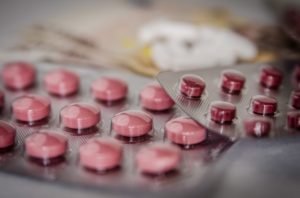We all indulge in bad habits from time to time. We’re only human, after all! And we do our best to avoid bad habits. But what about the ones that we don’t realize are bad? When it comes to preserving our kidneys’ health, we often overlook common habits that seem benign. Could you be harming your kidneys without realizing it? Watch out for these common habits that damage your kidneys!

Habit #1: Using Too Many Painkillers
 When it comes to your kidney health, over the counter painkillers present a serious risk for long term damage. The class of drugs which are the main culprit are Non-Steroidal Anti-Inflammatory Drugs (NSAIDs) such as Advil, Motrin, Ibuprofen, and Toradol. It’s not uncommon for woman to consume large volume of painkillers over months to years to due severe menstrual cramps. Those with arthritis, joint pain, or chronic headaches may also consume large quantities over time.
When it comes to your kidney health, over the counter painkillers present a serious risk for long term damage. The class of drugs which are the main culprit are Non-Steroidal Anti-Inflammatory Drugs (NSAIDs) such as Advil, Motrin, Ibuprofen, and Toradol. It’s not uncommon for woman to consume large volume of painkillers over months to years to due severe menstrual cramps. Those with arthritis, joint pain, or chronic headaches may also consume large quantities over time.
Both over-the-counter and prescription pain medications can damage and reduce blood flow to the kidneys. Kidney disease caused by prescription and pain medication is called ‘analgesic nephropathy’. Long-term use of certain pain medications, especially at high doses, has a harmful effect on the kidney. As many as 1-3% of new cases of chronic kidney failure each year may be caused by overusing pain medication! So try to keep painkillers to a minimum. Your kidneys will thank you.
Habit #2: Smoking Cigarettes
Smoking presents a strong risk factor for many kidney diseases, including cancer. Diseases that affect the kidneys, such as diabetes and high blood pressure, are also exacerbated by smoking, which can lead to needing dialysis sooner.
Habit #3: Eating Too Much Sodium
Hold the salt shaker! Adding too much salt at meals or consuming highly processed foods is one of the most common ways that salt creeps into your diet. Sodium causes water retention and both together will increase the volume of blood flowing through your arteries. Over time, this raises your blood pressure. But why does this matter? Glad you asked!
- High blood pressure damages the kidneys over time and presents a leading cause of kidney failure.
- The typical American diet has been estimated to contain more than 3400mg of sodium per day. That figure is substantially higher than the 2,300 mg daily maximum (about a teaspoon of salt) recommended by the FDA.
- The easiest way to not go over the daily allotment of a “low sodium diet” of 2400 mg per day is to eliminate all processed foods. If you have to ‘open it’, i.e. a can, a packet, a box then don’t eat it. Minimize the salt you add while cooking to a tiny pinch and don’t add extra salt to your food. Give yourself a few months and your BP may start to trend down.
Another way to lower your dietary salt intake is by following the DASH Diet. DASH is an acronym for the Dietary Approaches to Stop Hypertension, and it’s a great place to start learning how to control your blood pressure!
Habit #4: Eating and Drinking Lots of Sugar
Remember that delicious donut you saw as the beginning of this article? Here’s another one for good measure.

Most of us know that donuts are not healthy for our waistlines–but did you know these high sugar treats hurt your kidneys as well? Eating and drinking lots of sugar is one of the most common habits that damage your kidneys. Obesity and diabetes directly impact how well your kidneys function. In fact, diabetes is the #1 cause of kidney disease in the US. When too much sugar introduces diabetes into the equation, your kidneys no longer filter protein from your system as effectively. That’s why the first sign of diabetes affecting your kidney is protein in the urine.
The FDA recommends 25 grams of sugar a day. Did you know that one can of soda or glass of fruit juice BY ITSELF can push you over this limit? Next time you consider having some OJ for breakfast, check the container for how much sugar you’re drinking. Remember to look at the serving size too!
By cutting back on processed sugars, you will eat less calories and even sodium. Both your kidneys and your waistline will thank you!
#5: Exposure to Contrast Dyes Commonly Used in Imaging
You’ve probably had an MRI or CT scan sometime in your life (or maybe you’ve had many). While getting these scans aren’t really a “habit”, the dye can cause an insult to the kidney. Contrast dye may be used for CT scans to better help visualize the tissue. Contrast dye is also injected during a coronary angiogram used in the diagnosis and treatment of Coronary Artery Disease. Unfortunately, this contrast dye damages our kidneys and can lead to Acute Kidney Injury or AKI.
AKI results in an abrupt decrease in kidney function and occurs in up to 20% of all hospitalized patients, and over 45% of patients in a critical care setting. If you have normal kidney function, you may not have to worry about contrast dyes. In case of those with reduced kidney function contrast dye is administered with caution and typically in consultation with a Nephrologist. If you live in the southern California area, you can call Dr. G’s office to schedule an appointment: (714) 435-0150.
By following these simple tips, you can potentially prevent damage to your kidneys. Every little bit of knowledge and effort to improve your health helps!

